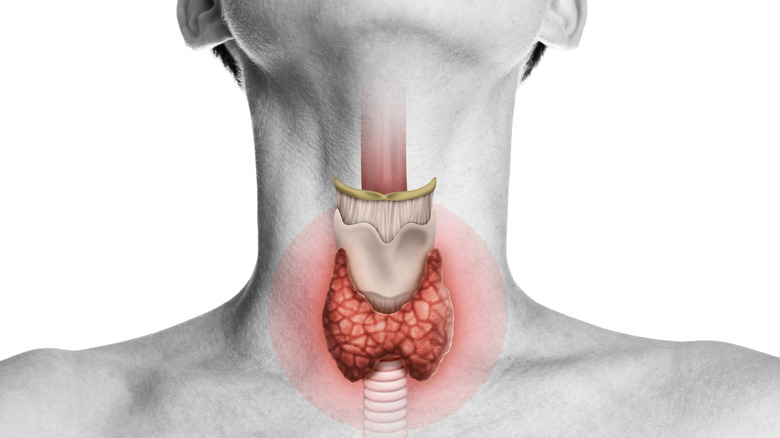When Should You Be Concerned About Thyroid Nodules?
According to the British Thyroid Foundation, the thyroid gland — which is situated in the neck — produces the thyroid hormones known as thyroxine (T4) and triiodothyronine (T3). These hormones travel to the bloodstream and influence how your cells and tissues work. However, thyroid disorders, such as the abnormal growth of thyroid cells, can occur in some people. These are known as thyroid nodules (via The American Thyroid Association). Most thyroid nodules are non-cancerous — however, a small number are.
According to the Cleveland Clinic, about 20% to 76% of adults are found to have thyroid nodules during an ultrasound. However, researchers are yet to understand why thyroid nodules form. From what they know, the nodules come in multiple forms. Furthermore, thyroid nodules can be linked to various conditions, including an autoimmune disease called Hashimoto's thyroiditis, according to Healthline. Other underlying conditions associated with thyroid nodules include thyroid cancer, thyroiditis (chronic inflammation of your thyroid), and iodine deficiency (via Healthline).
When should you be concerned about thyroid nodules?
Most thyroid nodules are benign or non-cancerous. According to the Cleveland Clinic, only about 3 out of 20 thyroid nodules are malignant or cancerous. However, the low death risk associated with thyroid nodules shouldn't be a yardstick to take the condition lightly. The symptoms associated with thyroid nodules aren't so obvious, as noted by the Mayo Clinic. In some cases, additional thyroxine is produced by the nodules, which causes increased sweating, unexplained weight loss, insomnia, and nervousness, per the Mayo Clinic. Nevertheless, the general symptoms associated with thyroid nodules are discreet, and you might unknowingly have the condition. This is particularly concerning if your nodules are large enough to touch.
According to the University of Central Florida, nodules that exceed 1 centimeter may indicate a serious condition. Large and fast-growing nodules are usually associated with thyroid cancer. According to the university, thyroid cancer can make you uncomfortable when moving your head and swallowing food. If you experience these symptoms, please contact your doctor immediately.
Diagnosis and treatment of thyroid nodules
According to Johns Hopkins Medicine, your doctor might advise monitoring the identified nodule over time and assessing its growth and symptoms. Beyond physically examining a nodule and predicting its growth, an ultrasound can help evaluate a thyroid nodule and determine whether you should have a biopsy, per Johns Hopkins Medicine. This involves collecting and placing cell samples from the nodule under a microscope, which provides doctors with more insight into the behavior of the nodule.
Treatments may be recommended based on how benign or cancerous the nodule is (via the Mayo Clinic). Your doctor might also recommend thyroid hormone therapy if your diagnosis reveals a dip in your thyroid gland's ability to produce enough hormones, which is known as hypothyroidism. Even though surgical treatments are a mainstay for cancerous nodules, a non-cancerous nodule may require surgery. This might be especially necessary if your condition makes it hard to swallow or breathe, according to the Mayo Clinic. You may also need a surgical procedure if large multinodular goiters develop due to your condition, constricting airways, the esophagus, or blood vessels, per the Mayo Clinic.
Other minimally-invasive procedures that are effective in treating benign thyroid nodules include radiofrequency ablation, alcohol injection, and ultrasound or laser ablation (via a 2019 study published in the journal Molecular Medicine Reports).



